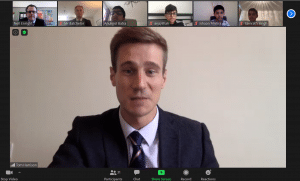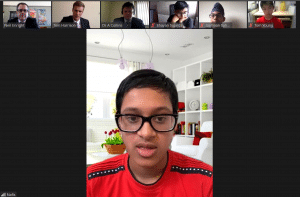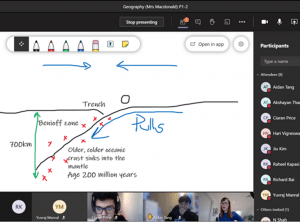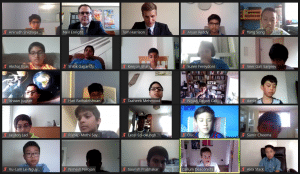During periods of remote learning, the School aims to continue to deliver an excellent and rounded educational experience to all pupils. This includes quality pastoral care and enrichment opportunities, alongside the maintenance of a full timetable of academic studies.
The School’s approach to remote education has been developed with reference to a strong evidence base, such as the research of the Education Endowment Foundation and the experience of other settings. The online offer, known as the eQE experience, continues to develop to make best use of additional technological tools and methods.
Below we set out some information on what to expect from remote learning at QE.
Where the School is open, or partially open…
What if a pupil is isolating at home when the School is open?
Under the government’s Living with Covid Plan, close contacts of positive Covid-19 cases are no longer expected to isolate or complete daily testing, and the legal requirement to self-isolate has ended. In most circumstances, therefore, pupils should be attending School as normal. Those with Covid-19 should adhere to current public health advice and then follow the normal routines for pupils absent from School due to illness. When feeling well enough, they should seek information from their teachers and peers and utilise resources provided via eQE (our online learning portal) to catch up on any work missed. Teachers may ask for work to be submitted electronically, via eQE, for marking and feedback.
A pupil’s Head of Year will facilitate extra support in cases of more prolonged absence.
What if the School is partially closed?
This scenario has not yet arisen, with mitigation measures preventing whole year groups needing to be off School. However, should the School be open to only some year groups, for example as part of a staggered re-opening, or in the event of of an outbreak, those year groups invited to School should attend – with anyone unwell following the above instructions – whilst other year groups should follow the arrangements below for full remote education.
Where the School is closed to all bar vulnerable pupils and those whose parents are key workers….
What is the routine when the School is closed?
 Pupils follow their full timetable using eQE and Microsoft Teams. This includes morning registration each day, and afternoon form group sessions (including Personal Development Time and assemblies) on Mondays, Tuesdays, and Thursdays – as per the usual School timetable. At the time each lesson would begin in School, pupils join the MS Teams meeting set up for that class. Every lesson includes an online meeting with their teacher, unless the teacher is absent – in which case independent work will have been set via eQE. Work set should have clear time limits, communicated to pupils, and takes account of the time pupils are spending in online meetings. Together this equates to over 5 hours of timetabled learning for pupils in all year groups, each day, with further independent work increasing as pupils progress up the School.
Pupils follow their full timetable using eQE and Microsoft Teams. This includes morning registration each day, and afternoon form group sessions (including Personal Development Time and assemblies) on Mondays, Tuesdays, and Thursdays – as per the usual School timetable. At the time each lesson would begin in School, pupils join the MS Teams meeting set up for that class. Every lesson includes an online meeting with their teacher, unless the teacher is absent – in which case independent work will have been set via eQE. Work set should have clear time limits, communicated to pupils, and takes account of the time pupils are spending in online meetings. Together this equates to over 5 hours of timetabled learning for pupils in all year groups, each day, with further independent work increasing as pupils progress up the School.
Alongside timetabled lessons, a number of extra-curricular clubs and activities are on offer. Pupils should check eQE for details as to when and how particular groups are meeting online.
How is work accessed when the School is closed?
Work is set on eQE on the day of the lesson. This might be by 9am or at the time that the lesson starts. This allows pupils to view the eQE task resources (for example, activity instructions, PowerPoint presentations, worksheets, weblinks etc.) at the start of the lesson as the teacher is explaining the work via the MS Teams meeting. Work is set for each individual lesson separately. The work set will include a variety of activities over time, some of which are non-computer based.
eQE may also be used for assessments, such as quizzes and end of topic tests.
Will teaching be ‘live’?
Each lesson involves contact with the class teacher via a MS Teams meeting. These meetings take place during the timetabled lesson, to avoid clashes with other subjects.
Teachers either:
- Teach the entire lessons via MS Teams, using the screen share option and eQE tasks to share any documents needed; or
- Provide some instruction via MS Teams at the start of the lesson and then send guided independent learning via eQE tasks for pupils to complete on their own during the lesson – asking them to re-join the MS Teams meeting at an agreed time towards the end of the lesson so that teachers can review their learning and answer any questions.
MS Teams is used flexibly, depending upon the nature of each individual lesson and its objectives. ‘Breakout rooms’ may be used within the meeting to facilitate collaborative group work between pupils.
What is the purpose of online meetings?
 Online meetings provide a way to increase interaction, collaboration, and provide face-to-face feedback.
Online meetings provide a way to increase interaction, collaboration, and provide face-to-face feedback.
In addition to ensuring that online meetings are safe for both students and colleagues (by following the safeguarding protocols that have been established), it is also important to ensure that their use is purposeful so that time is not wasted.
The following examples outline some scenarios in which an online meeting might most successfully be used:
- To set up the learning activities to be completed during the lesson at the start of the lesson, and then to review the learning that has taken place and answer any questions at the end of the lesson;
- To teach full lessons if appropriate – so that complex content (particularly at GCSE and A-level) can be explained, learning activities can be monitored and questions answered, and learning can be reviewed throughout the lesson;
- To set up a complex learning activity;
- In subjects for which there is a significant listening, speaking, or performing component, to conduct assessment;
- To enable collaboration through group discussion, for example, to support learning or to allow the exploration of different ideas;
- Where pupils are asked to research and prepare in advance for an online class/small group debate or discussion;
- Where pupils are asked to research and prepare presentations to deliver to each other;
- For pupils undertaking coursework, to allow them to share ideas and feedback with their peers;
- To resolve potential misconceptions or misunderstandings where very challenging content needs assessing before progressing with the curriculum.
What is taught?
 The scope of the curriculum remains broad and balanced. So far as is practical, departments are guided by their usual curricula. However, some adaptations will be made to the curriculum and schemes of work in recognition of the challenges faced by pupils when working independently and remotely, including the recognition that it will take pupils longer to complete tasks when working alone than it would if they were in the classroom supported by teachers and their peers. Greater adaptations may be required in more practical subjects, such as PE, Art, Music, and Technology, where pupils will not be able to access the usual facilities and equipment. In every case, pupils maintain their usual number of timetabled hours in each subject.
The scope of the curriculum remains broad and balanced. So far as is practical, departments are guided by their usual curricula. However, some adaptations will be made to the curriculum and schemes of work in recognition of the challenges faced by pupils when working independently and remotely, including the recognition that it will take pupils longer to complete tasks when working alone than it would if they were in the classroom supported by teachers and their peers. Greater adaptations may be required in more practical subjects, such as PE, Art, Music, and Technology, where pupils will not be able to access the usual facilities and equipment. In every case, pupils maintain their usual number of timetabled hours in each subject.
Departments continue to closely follow course syllabuses at GCSE, AS and A-level.
The pastoral curriculum continues to be delivered by form tutors and Heads of Year during the timetabled lessons.
How is engagement and progress assessed?
Attendance is checked via daily registration sessions and in online lessons. Non-attendance is followed up and parents will be contacted if concerns arise.
Some activities require work to be submitted through eQE for marking and feedback, for which clear instructions should be given about what pupils should submit, by when, and how. The regularity of feedback varies between departments based upon the number of periods pupils spend with them, particularly at KS3. Feedback is constructive and designed to aid progression.
Pupils will be sent reminders via eQE if they are falling behind with work. Teachers will communicate via eQE to try and help resolve any issues. If unresolved, parents may be called – as advised by Heads of Subject or Heads of Year.
Assessments are conducted to consolidate learning and check understanding. These may take the form of quizzes and tests taken on eQE, written assignments, or oral assessment in online meetings. Assessment data continues to be recorded and tracked to support pupil progression.
What support is in place to help pupils?
Each lesson contains an online meeting, in which pupils have the opportunity to ask questions to their subject teacher. Comments can also be added to an eQE task to communicate with staff, and eQE forums have been established to facilitate questions and discussion between peers and with teachers. Each lesson should contain information on what pupils should do if they get stuck (including how to contact their teachers with questions, alongside helpful resources and web links). Staff endeavour to answer questions within 24 hours.
 Daily registration is a regular opportunity for pupils to raise any concerns or difficulties with their form tutors, whether these are connected to remote learning or any other aspect of their wellbeing. Small group bespoke tutorials provide a longer opportunity to discuss progress, participation and wellbeing with pastoral staff.
Daily registration is a regular opportunity for pupils to raise any concerns or difficulties with their form tutors, whether these are connected to remote learning or any other aspect of their wellbeing. Small group bespoke tutorials provide a longer opportunity to discuss progress, participation and wellbeing with pastoral staff.
Support networks, such as mentoring and access to the School counsellor, are maintained online wherever possible.
Those pupils identified as struggling to access online remote education, due to lack of IT hardware, have been supplied with laptops. Where pupils are vulnerable by virtue of not being able to work effectively at home, extra tailored support is coordinated by the pastoral leadership team and pupils may be invited to work in School. Parents with concerns about their son’s ability to access remote education should contact the School.
 Where pupils have special educational needs, teachers differentiate tasks and/or teaching methods, as required, in order to meet their needs. Teachers have due regard to the inclusion reports that inform in-School support measures and reflect their provisions in remote education.
Where pupils have special educational needs, teachers differentiate tasks and/or teaching methods, as required, in order to meet their needs. Teachers have due regard to the inclusion reports that inform in-School support measures and reflect their provisions in remote education.
What about extra-curricular involvements?
Efforts have been made to adapt elements of the in-School enrichment offer for the period of School closure. Examples include: some clubs and societies going live on MS Teams; online drama rehearsals; online music concerts; online chess competitions; and the home enrichment pages on eQE, providing suggestions and resources. Pupils are encouraged to participate as fully as possible to support their all-round development and to promote good mental health.
